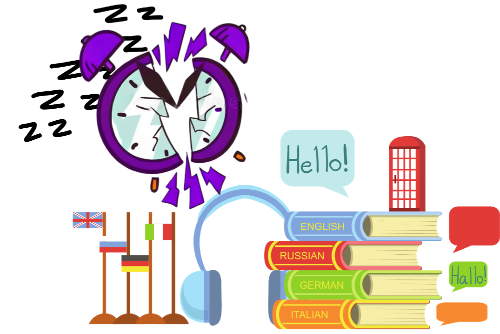Can You Learn a Second Language Overnight? Setting Realistic Expectations

Ever found yourself dreaming about waking up fluent in another language, just like in those tempting advertisements that promise overnight success?
We've all been there, scrolling through the internet, our eyes latching onto slogans like "Speak Spanish in Your Sleep!"
But let's step back and ask the million-dollar question: Can you really learn a second language overnight?
Spoiler alert (with a wink):
Nope, not happening.
But don't click away just yet, because the truth is, while you can't become a linguistic master in your sleep, setting realistic expectations can fast-track your progress more than you think.
The Reality of Overnight Language Learning
Let's bust some myths first.

Many people assume that rapid language acquisition is just a matter of dedication or even a secret technique they haven't discovered yet. But the reality is that learning a new language requires time and effort.
Studies suggest that reaching proficiency in a language, depending on its difficulty relative to your native tongue, can take anywhere from 600 to 2200 hours of study, according to the Foreign Service Institute (FSI) language learning categories.
And let's be real here, the physical act of learning a language while you snooze is about as plausible as your dog starting to recite Shakespeare.
The Connection Between Brain Function and Language Learning
Contrary to zapping knowledge into your brain like in sci-fi movies, language learning is a more complex cognitive process. Neuroplasticity, or the brain's ability to form new neural connections, plays a significant role in this process.
To solidify these connections, learning methodologies like language immersion and spaced repetition are crucial. They boost language acquisition – the natural way we absorb language – which is different from the more structured language learning approach.

In an article by Forbes.com, research conducted by two Swiss universities presented evidence that language learning during sleep is possible; however, it doesn't equate to achieving polyglot status overnight.
The study specifies the conditions required for this technique to be effective—specifically, it only works if the individual has already been exposed to the language material prior to sleeping.
So, while there's a chance you could snag some vocab in your zzz's, it's not like you'll snooze your way to sounding like a United Nations interpreter. You've gotta meet your brain halfway before bedtime—no dream dictionaries included!
Become a Polyglot: Master Multiple Languages with SMART Strategies
You wouldn't train for a marathon by planning to run 26.2 miles on your first day, right? Similarly, it's essential to set achievable language learning goals.
Familiarize yourself with language proficiency levels, ranging from A1 for beginners to C2 for those who have mastered a language.
And be SMART about it – set Specific, Measurable, Achievable, Relevant, and Time-bound goals.
Tips to Fast-Track Your Language Learning

Now to the good part: accelerating your language learning journey. Get your feet wet with immersive learning; it's the closest you can get to living in a country where your target language is spoken.
Incorporate contextual learning into your routine by using words and phrases in real-life situations.
Modern tools like interactive software can also make a difference. And don't underestimate polyglot techniques, such as mnemonics or the intriguing concept of language laddering.
Put emphasis on actions that increase vocabulary retention and understanding of grammar. This includes making flashcards, practicing with native speakers, and, most importantly, making a consistent effort every day.
Incorporating Technology into Language Learning
Nowadays, language learning has gone full cyborg with digital aids. Apps like Phrasing.app can be formidable allies in your learning quest. It's like having a pocket-sized tutor who's always up for a lesson.
Additionally, podcasts and online tutoring provide targeted practice and real-time feedback, which is gold for language learners.
The Importance of Persistence and Patience in Learning a New Language

Remember, acquiring a new language is more of a marathon than a 100-meter dash. There's beauty in the struggle, and success stories often highlight the years of dedicated effort behind seemingly overnight achievements.
The fantastical notion of overnight language learning is just that – a fantasy. But by embracing the journey with a realistic mindset and by celebrating every little milestone, you are setting yourself up for a success that's far sweeter than any fictional overnight triumph could be.
Ready to embark on your language learning adventure?

Sig up with Phrasing today and join the ranks of passionate language learners who know that every effort counts and each word learned is a step closer to fluency. You've got this – ¡Buena suerte! Bonne chance! Viel Glück! Good luck!
